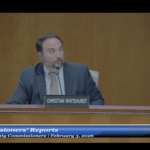Commissioners adopt 50% conservation fee, waive fees for affordable housing, and discuss SB-180 concerns
County commissioners approved a new conservation impact fee and expanded affordable housing incentives during their October 21 meeting, while debating whether to join a lawsuit against a state law that limits local control over development.
Conservation Impact Fee Approved
The board voted to establish a new conservation and open space impact fee at 50% of the maximum allowed amount. The fee will require new homebuyers to help pay for conservation land purchases.
Commissioner Whitehurst explained that current homeowners already pay about $18 per year through property taxes to support the county’s Land Acquisition Management Program (LAMP), which receives $2 million annually.
“It was always my belief that the $18 per year from each homeowner in St. John’s County was part of their will, the current homeowners,” Whitehurst said. “And that’s why I supported the $2 million per year LAMP fee, and I also support enacting a new conservation impact fee at the 50% level, not at the 100% level, but I want new homeowners to pay for conservation lands.”
A motion to adopt the full 100% conservation impact fee failed by a 2-3 vote. The board then moved forward with the 50% fee, which will come back for a second and final vote on November 4.
Affordable Housing Fee Waiver Expanded
Commissioners gave staff direction to waive 100% of impact fees for affordable housing units built for residents earning 50% or less of the area median income (AMI).
The original proposal would have waived only 50% of fees for these low-income units. Commissioner Murphy made the motion to increase the waiver to 100% to better incentivize developers to build housing for the county’s lowest-income residents.
The new fee structure will include deed restrictions requiring properties to remain affordable for 30 years. The restrictions will apply to both rental and purchase units.
Commissioner Taylor expressed concerns about enforcement, noting that some workforce housing developments do not properly verify income levels.
“We need to have something in place where we’re making sure that it’s going to who it’s intended to go to, and that’s not happening,” Taylor said.
County Attorney Keely West assured commissioners that affordable housing units require income qualification through a formal process based on HUD guidelines, and the new rules will be incorporated into development review procedures.
Senate Bill 180 Debate
Commissioners discussed whether to join a lawsuit against Senate Bill 180, a state law that limits local government’s ability to regulate development near areas affected by natural disasters.
The cost to join the lawsuit is $10,000, with additional fees of $5,000 if the case is appealed and another $5,000 if it reaches the state Supreme Court.
Commissioner Murphy argued against joining the lawsuit, saying the state legislature will likely amend the problematic parts of the law during the upcoming session.
“There are three things that they recognize and are very confident will be changed,” Murphy said, referring to the geographic scope, time limitations, and vague language in the current law. “Before we spend tax dollar monies…I just think we save the taxpayer dollars.”
The legislative session begins in early 2025, with committee work starting in March. Murphy suggested waiting to see what changes are proposed before spending money on legal action.
Commissioner Whitehurst said he had met with state legislators to express residents’ concerns about losing local control over development decisions.
“I want to put that on your radar,” Whitehurst said about his conversations with the legislative delegation. “We have a lot of residents in our county who are concerned about the impacts that 180 is having on local control.”
The board reached consensus to wait until the legislative session begins before deciding whether to join the lawsuit. Staff was directed to add SB-180 concerns to the county’s legislative priorities for the upcoming delegation meeting.
Community Recognitions
The board issued several proclamations and recognitions:
First Coast Cultural Center received a certificate recognizing its 30th anniversary. The Ponte Vedra Beach organization has provided arts programming, exhibits, classes, and speaker series for three decades. One of its flagship programs is a 19-year-old music therapy program serving children with disabilities in St. Johns County schools.
National Adoption Month was proclaimed for November 2025. Laura Alexander, a foster parent who has adopted one son and is adopting another, spoke about her six-year journey. “Adoption through foster care is not just about giving a child a home. It is about walking beside them in their biological family, often through grief and transition, and building something lasting, grounded in both trust,” she said.
National Hispanic Heritage Month was recognized from September 15 through October 15, 2025. The proclamation noted that St. Johns County’s Hispanic population doubled from 2010 to 2020 and highlighted the county’s deep historical ties to Hispanic culture dating back to the founding of St. Augustine in 1565.
Legislative Priorities Set
The board approved a legislative action plan for the upcoming state session, including priorities in four categories: transportation and infrastructure, coastal protection, conservation and agriculture, and government operations.
Key priorities include:
Transportation: The board emphasized the need for funding to complete the International Golf Parkway interchange project. The Florida Department of Transportation has allocated $1.7 million for design and permitting. Staff will work with state representatives to request additional appropriations as opportunities arise.
Coastal Protection: The board wants to continue collaboration with the Army Corps of Engineers for beach renourishment projects and seeks regional partnerships to address Summer Haven erosion issues.
Conservation: Commissioners support the Water First initiative for Northeast Florida to find sustainable water sources. They also want to protect working agricultural lands and support the Rural Renaissance program for the Hastings area.
Biosolids Processing: Chair Joseph raised concerns about other counties bringing biosolids to St. Johns County for processing, impacting residents’ quality of life. “I don’t think that it’s right that all these other counties are coming to our county and it’s impacting our residents’ quality of life,” Joseph said. The board directed staff to add this issue to legislative priorities, asking the state for funding to help with mandated processing requirements.
Government Operations: The board seeks state funding for Parkinson’s disease research related to firefighters’ exposure to toxic chemicals, library construction grants, and relief from unfunded mandates on utilities.
Staff also requested protection for child welfare workers’ identities in public records requests, similar to protections given to guardian ad litem volunteers.
Public Comments on Development
Several residents spoke during public comment about development and environmental concerns.
Benjamin Brandau urged the board to protect wetlands, saying they are critical for flood control, fire prevention, and drinking water. “The continued destruction of our wetlands is tantamount to a crime against humanity,” he said. He encouraged commissioners to require developers to incorporate wetlands and water features into projects.
Other residents voiced concerns about property rights versus conservation needs.
Other Business
Commissioner Joseph shared updates on recent community events:
- Three residents were inducted into the St. Augustine High School Hall of Fame: Betty Thompson (class of 1955), Robert Newman, and a state championship-winning football coach.
- Lieutenant JG Ralph C. Dupont, who died in a World War II dogfight in the Pacific and was missing for 80 years, was finally laid to rest on October 12 at the Bisetti Family Cemetery. The ceremony was attended by the lieutenant governor, an admiral, and family members.
Chair Joseph also raised concerns about Betty Griffin House, a domestic violence support organization, needing new office space near the courthouse. County Administrator Wanchick reported that staff is working with the organization to find space in the Health and Human Services building or another county facility near the courthouse.
“They need to be close to the court,” Joseph said. “They need to see, after the domestic judge, be able to go there and get some help.”
Meeting Details
The meeting was held on October 21, 2025, at the county commission chambers. All commissioners were present. The board will meet again for a legislative delegation meeting on October 27 and will hold second readings on the impact fee ordinances on November 4.
The meeting included an invocation by a pastor from Anastasia Baptist Church and the Pledge of Allegiance led by Chief Warrant Officer Jerry from the United States military.








